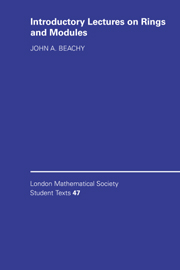2 - MODULES
Published online by Cambridge University Press: 05 June 2012
Summary
If A is an abelian group, α ∈ A, and n ∈ Z+, then na is defined to be the sum of a with itself n times. This ‘scalar multiplication’ can be extended to negative integers in the obvious way. The properties that hold for this multiplication are the same as those for a vector space, the difference being that the scalars belong to the ring Z, rather than to a field. Relaxing the conditions on the set of scalars leads to the definition of a module.
The objects of study in this chapter are modules over arbitrary rings, and they can be thought of as generalizations of vector spaces and abelian groups. We will also see that they can be regarded as ‘representations’ of a ring, in the same sense that representations of a group are defined by homomorphisms from the group into various groups of permutations or groups of matrices. Since we have already seen that in a sense the ‘generic’ rings are rings of endomorphisms of abelian groups, a representation of a ring should be a ring homomorphism into the ring of all endomorphisms of some abelian group. In Section 2.1 we introduce some basic definitions, including those of a module and a module homomorphism, and prove many of the theorems that correspond to the elementary theorems of group theory. The following sections extend familiar properties of vector spaces and abelian groups.
- Type
- Chapter
- Information
- Introductory Lectures on Rings and Modules , pp. 63 - 136Publisher: Cambridge University PressPrint publication year: 1999
- 1
- Cited by



